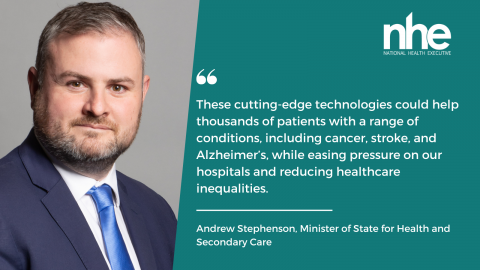The government is funding a series of new breakthrough medical technologies in a bid to fast-track promising solutions so the NHS and its patients can benefit sooner.
As part of a new innovative devices access pathway (IDAP), the £10m investment will support eight solutions that target everything from cancer and Alzheimer’s disease to stroke and multiple sclerosis.
The technologies include a device that uses ultrasound waves to kill cancer tumours without damaging healthy tissue, in turn offering an alternative to intensive radiotherapy.
Another is a blood test to help clinicians distinguish whether cognitively impaired patients should receive extra tests for Alzheimer’s. It could lead to earlier diagnosis and treatment.
A portable blood test, meanwhile, could help ambulance staff identify if patients have a blood clot blocking flow to the brain. Paramedics cannot do this currently meaning the test could signal stroke earlier so patients have a better chance of avoiding disability.
The power of AI will also be investigated, specifically to predict those at risk of being admitted to hospital for chronic obstructive pulmonary disease. Clinicians can better treat these patients by collecting relevant data from wearables, sensors, and apps.

One technology will focus on narrowing inequalities in lung health, with a device that can detect oxygen levels from inside the ear. Oximeters are widely used across healthcare to assess lung function, but research has suggested they may not be as effective for people with darker skin.
This new device will measure oxygen levels from a patient's inner ear-canal which is not pigmented regardless of skin colour, opposed to oximeters which are clipped on the end of a finger.
A new smartphone app could help multiple sclerosis patients better manage their condition, through the delivery of customisable exercises, cognitive behaviour therapy and physical activity.
An at-home finger prick test has been developed to help chemotherapy patients stave off neutropenic sepsis, which is a potentially fatal condition for those with a suppressed immune system.
Another device could allow NHS patients to know whether they are infected with something or not three days before a normal diagnosis is possible. This is earmarked to help systemic inflammatory response syndrome, a life-threatening condition caused by the body’s response to infection or inflammation.
The Department of Health and Social Care says the £10m investment in the pilot is part of wider work to streamline medical technology access. This will be spearheaded by:
- Medicines and Healthcare products Regulatory Agency (MHRA)
- National Institute for Health and Care Excellence
- NHS England (NHSE)
- Health Technology Wales
- Scottish Health Technology Group
The MHRA’s chief science and innovation officer, Dr Marc Bailey, said: “We are very excited to announce the final eight selected technologies in the new IDAP pilot scheme.
“This is designed to explore how support from the regulator, UK health technology organisations and NHS bodies can accelerate the development of transformative medical devices from their initial proof of concept through to uptake in the NHS.”
Interim national transformation director at NHSE, Dr Vin Diwakar, described the news as an “important milestone” in making sure the health service continues to benefit from the latest and greatest technologies.
“We will be working closely with our partners to support those companies selected for the pilot so that more game-changing, life-saving technologies are introduced quickly and safely on the NHS,” said Dr Diwakar.
Image credit: iStock



















